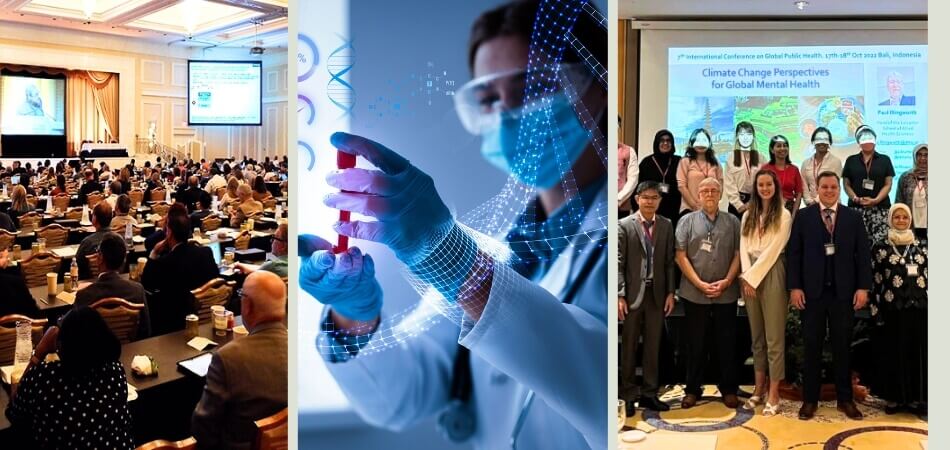The world of academia and professional discourse is vast and varied. Within this expansive landscape, you might occasionally hear about the health science conference. But, what is the health science conference?
Essentially, it’s an illuminating event geared towards the exploration and discussion of health sciences. From the intricate details of neuroscience and medical sciences to the profound insights of clinical research, these conferences cover a broad spectrum.
They also touch upon more niche areas like disability studies, environmental medicine, medical physics, and epidemiology. For those keen on gaining knowledge, forging connections, or staying abreast of developments in health sciences, these conferences are nothing short of treasure troves.
What is the Health Science Conference?
Navigating the intricate world of health, one often encounters pivotal gatherings known as health science conferences. These events offer an amalgamation of knowledge, innovation, and networking. They stand as lighthouses in the vast ocean of medical research and practice.
Health science conferences are specialized platforms dedicated to health-related topics. They bring together experts, professionals, and enthusiasts from various fields. The aim is to share knowledge, research findings, and the latest innovations.
The scope of these conferences is impressively broad, encompassing multiple areas of interest. Topics range from neuroscience and clinical research to disability studies and medical physics. Additionally, they touch upon environmental medicine and the pivotal subject of epidemiology.
Beyond knowledge dissemination, these events foster networking and collaboration opportunities. Attendees get a chance to meet like-minded individuals, share insights, and potentially forge new partnerships. In essence, these conferences drive the evolution of the health science sector.
The Purpose of the Health Science Conference
In the vast domain of health sciences, specific gatherings stand out for their significance and impact. These are the health science conferences. Their purpose, multifaceted and essential, can be broken down as follows:
- Knowledge Sharing: Health science conferences act as crucibles where groundbreaking research meets global audiences. They facilitate the dissemination of innovative ideas and findings.
- Networking Opportunities: These events create a nexus for professionals to connect and collaborate. Here, new partnerships form, enriching the health science community.
- Professional Development: Attending such conferences aids in honing skills and gaining new perspectives. It’s a boon for professionals seeking advancement and growth.
- Policy Formation: Often, discussions lead to the evolution of health policies and strategies. These can shape healthcare trajectories at regional or global scales.
- Technological Showcases: Emerging technologies in health sciences find a spotlight here. Attendees get first-hand exposure to the latest tools and innovations.
- Collaborative Research: By pooling resources and intellect, conferences foster joint research ventures. Multiple organizations might converge on shared goals and projects.
In essence, health science conferences are not just events; they’re catalysts. They accelerate knowledge, collaboration, and innovation in the ever-evolving realm of health sciences.
Different Types of Health Science Conferences
The realm of health sciences is diverse and multifaceted, resulting in a myriad of specialized conferences tailored to specific fields of study. Each conference type offers a distinct lens through which we can view advancements, challenges, and breakthroughs. Let’s take a deeper dive into some of the more prominent types of health science conferences.
Clinical Research Conferences
These conferences illuminate the ever-evolving world of clinical trials, protocols, and patient-centric methodologies. Clinical research conferences serve as platforms where the latest studies on new drugs, treatment methodologies, and patient care are presented and scrutinized.
Moreover, these gatherings foster discussions on ethical considerations, best practices, and the future of clinical research. Regulatory professionals, pharmaceutical representatives, and clinicians collaborate to ensure that patient care remains at the forefront of advancements.
Neuroscience Conferences
Beyond merely exploring the intricate functions of the brain, neuroscience conferences dive into the complexities of neurological disorders, treatment modalities, and breakthrough research. They offer insights into areas like neurobiology, cognitive functions, and behavioral neurology.
Furthermore, with the convergence of technology and neuroscience, these events increasingly touch upon topics like neuroimaging, neuromodulation, and even brain-computer interfaces. Such interdisciplinary discussions help push the boundaries of what’s possible in brain science.
Medical Physics Conferences
Bridging the gap between medicine and physics, these conferences delve deep into the technologies and methodologies used for diagnosis and treatment. From MRI imaging to radiation therapy, the subjects discussed are vast.
Beyond just equipment, the convergence of computational models, algorithms, and medical procedures is a key highlight. Such conferences catalyze innovations that redefine patient care and treatment accuracy.
Epidemiology and Public Health Conferences
These conferences wear many hats. They delve into the patterns of diseases, public health responses, and global health strategies. Data analytics, trends, and prevention methodologies are core topics.
Given their public health focus, they often address pressing global health crises, vaccination strategies, and even socio-political determinants of health. Collaboration here is key to ensuring communities and nations are equipped to tackle health challenges head-on.
Each type of health science conference, with its unique focus and approach, contributes to the broader tapestry of healthcare knowledge and advancement. Attendees, researchers, and professionals alike benefit from these immersive experiences, pushing the boundaries of what we know and can achieve in health sciences.
Who Should Attend the Health Science Conference?
Health science conferences serve as epicenters of knowledge, innovation, and collaboration. Given their diverse nature, they appeal to a range of professionals and enthusiasts. Let’s discern who these individuals might be.
Researchers and Academicians
Health science conferences provide researchers a platform to present their groundbreaking findings. Academicians can glean insights, ensuring their teachings remain updated. Together, they shape the future trajectory of health sciences.
Medical Practitioners
For doctors, surgeons, and other medical professionals, these events are invaluable. They learn about novel treatments, techniques, and diagnostic tools. Continued education ensures optimal patient care and outcomes.
Healthcare Administrators
Those at the helm of medical institutions find great value here. They discover best practices, management techniques, and emerging healthcare trends. Armed with this knowledge, they can enhance healthcare delivery.
Policy Makers and Regulators
Conferences often touch upon the ever-evolving landscape of medical regulations. Policy makers and regulators gain insights into needed changes and innovations. Their decisions, informed by these events, can significantly impact public health.
Pharmaceutical and Biotech Professionals
Innovations in drug development and biotechnologies often debut at these conferences. Professionals in these sectors can assess market trends, collaborate, and network. The knowledge garnered influences drug discovery and biotech research trajectories.
The health science conference is not exclusive; it’s a melting pot of expertise and aspirations. From the benchside researcher to the bedside physician, these gatherings unify all in pursuit of advancing healthcare.
Benefits of Attending a Health Science Conference
The realm of health sciences is ever-evolving, and conferences serve as pivotal milestones in this journey. Attendees reap a plethora of benefits by participating. Let’s elucidate some of the prime advantages.
Knowledge Augmentation
Conferences offer a front-row seat to the latest in health science research. Attendees absorb new findings, methodologies, and cutting-edge techniques. This expanded knowledge aids in professional growth and expertise.
Networking Opportunities
Interacting with peers, experts, and thought leaders is a prime perk. These connections can lead to collaborations, job opportunities, or innovative ventures. Networking can reshape an individual’s career trajectory profoundly.
Skill Enhancement
Beyond mere knowledge, practical skills are honed at workshops and sessions. Participants learn from hands-on experiences and direct interactions. Acquiring new skills sets attendees apart in their respective fields.
Innovative Technology Exposure
Tech plays a pivotal role in modern healthcare. At conferences, the latest medical technologies and tools are showcased. Grasping these advancements ensures attendees remain at the forefront of technological integration.
Broadened Perspectives
Diverse voices, global insights, and varied methodologies converge at these events. Engaging in these dialogues fosters a broader understanding of global health challenges. This expanded worldview aids in more holistic problem-solving.
Participation in a health science conference transcends mere attendance; it’s an investment. An investment in knowledge, growth, and the collective future of healthcare and its myriad possibilities.
Tips to Find the Right Health Science Conference
Choosing the ideal health science conference can be a pivotal decision in one’s professional journey. With numerous options available, finding the right fit requires strategy and insight. Below are some tailored tips to guide the decision-making process.
- Research Focus: Identify conferences that align with your specific research or professional interest. An event closely mirroring your domain ensures relevant takeaways and engagements.
- Reputation and Reviews: Look for conferences with positive reviews and established reputations. Past attendees’ feedback can provide insights into the event’s quality and relevance.
- Speaker Lineup: Evaluate the list of keynote speakers and presenters. High-profile experts and renowned figures usually indicate a conference’s caliber and significance.
- Interactive Opportunities: Prioritize conferences that offer workshops, Q&A sessions, or hands-on labs. Interactive platforms enhance learning and offer more in-depth knowledge acquisition.
- Location and Logistics: Consider the venue’s accessibility, accommodation options, and overall logistics. A well-organized event in a convenient location can enhance the overall experience.
While the allure of numerous health science conferences can be overwhelming, selecting the right one is crucial. With focused research and the tips above, one can ensure a fulfilling and enriching conference experience.
Last Words
The vast domain of health sciences continually pushes the boundaries of knowledge and innovation. Central to this evolution are health science conferences. As you now know, what is the health science conference?
It’s a convergence point where professionals, researchers, and enthusiasts gather to share insights, collaborate, and propel the field forward. From the intricate details of specific disciplines to the overarching trends in healthcare, these events encapsulate it all.
They not only offer a platform for learning but also foster invaluable networking opportunities. In essence, understanding the significance and purpose of these conferences provides a roadmap for anyone looking to navigate the dynamic landscape of health sciences effectively.






